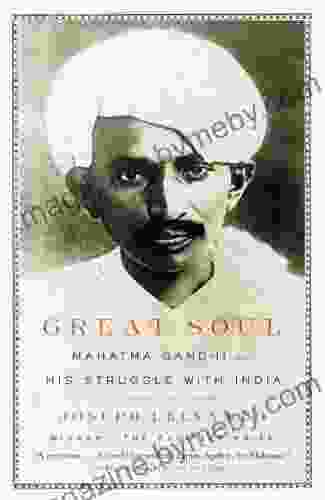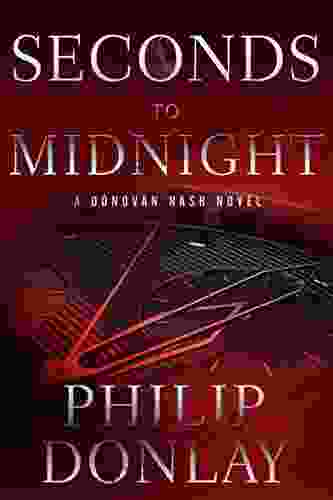Mahatma Gandhi and His Struggle for India: A Legacy of Non-Violence and Independence

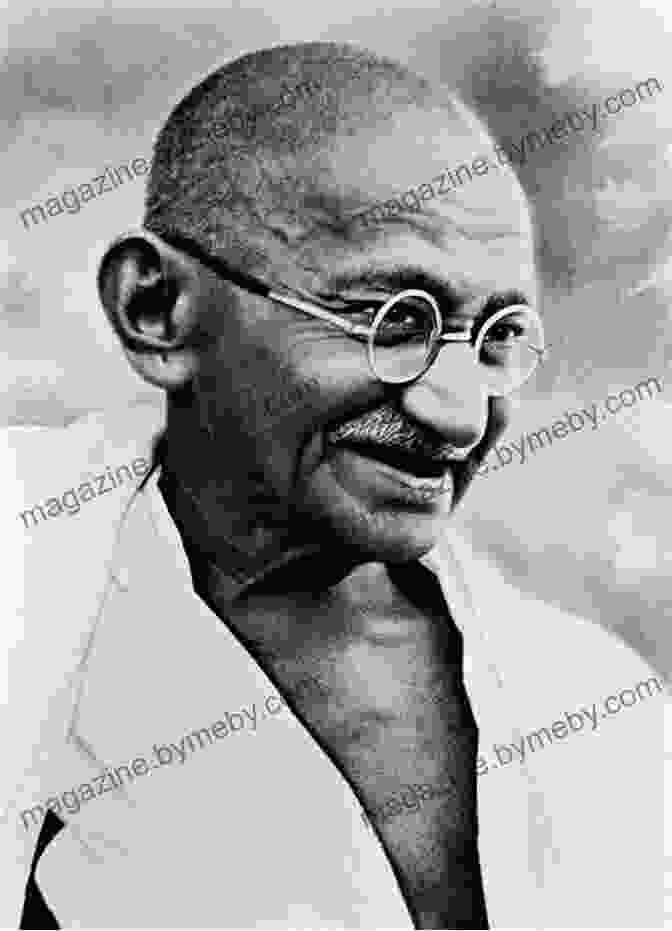
4 out of 5
| Language | : | English |
| File size | : | 2915 KB |
| Text-to-Speech | : | Enabled |
| Screen Reader | : | Supported |
| Enhanced typesetting | : | Enabled |
| Word Wise | : | Enabled |
| Print length | : | 449 pages |
Mahatma Gandhi, the "Father of India," was a visionary leader who dedicated his life to India's independence from British rule. His philosophy of non-violent resistance, known as Satyagraha, inspired countless people around the world and left an enduring legacy on the global stage.
This article explores the life and struggle of Mahatma Gandhi, highlighting his key principles, accomplishments, and the profound impact he had on India and the world.
Early Life and Education
Mohandas Karamchand Gandhi was born on October 2, 1869, in Porbandar, India. From an early age, he showed a strong sense of justice and compassion.
In 1888, Gandhi traveled to England to study law. During his time in England, he encountered the writings of John Ruskin, Leo Tolstoy, and Henry David Thoreau, which influenced his developing philosophy of non-violence.
Return to India and the Struggle for Independence
Upon his return to India in 1893, Gandhi began his legal practice in Bombay. However, he soon became disillusioned with the British legal system and turned his attention to activism.
In 1894, Gandhi traveled to South Africa to represent Indian merchants. It was during this time that he first developed his Satyagraha philosophy, which emphasized non-violent resistance to oppression.
Satyagraha: Gandhi's Philosophy of Non-Violence
Satyagraha means "truth force" in Sanskrit. It is a philosophy that rejects violence in all forms and advocates for non-cooperation with unjust laws and oppressive systems.
Gandhi believed that Satyagraha had the power to transform hearts and minds, ultimately leading to a more just and peaceful society.
The Indian Independence Movement
Gandhi returned to India in 1915 and became a pivotal figure in the Indian independence movement. He led numerous Satyagraha campaigns against British rule, including the Non-Cooperation Movement (1920-22),the Salt March (1930),and the Quit India Movement (1942).
Through these campaigns, Gandhi rallied millions of Indians and put immense pressure on the British government, ultimately leading to India's independence in 1947.
Gandhi's Legacy and Impact
Mahatma Gandhi's legacy extends far beyond India's independence. His philosophy of non-violence has inspired countless movements for social justice and human rights around the world.
Gandhi's principles have been adopted by leaders such as Martin Luther King Jr., Nelson Mandela, and Aung San Suu Kyi. His teachings continue to guide and inspire activists and change-makers to this day.
Mahatma Gandhi's life and struggle for India are a testament to the power of non-violence and unwavering determination. His legacy as the "Father of India" and a global icon of peace will continue to inspire generations to come.
Through his Satyagraha philosophy, Gandhi demonstrated that even the most oppressive systems can be overcome through peaceful resistance and the power of truth.
Learn More about Mahatma Gandhi
To delve deeper into the life and teachings of Mahatma Gandhi, we recommend the following resources:
- The Autobiography of Mahatma Gandhi
- Gandhi's Non-Violent Revolution
- Mahatma Gandhi, a documentary film
4 out of 5
| Language | : | English |
| File size | : | 2915 KB |
| Text-to-Speech | : | Enabled |
| Screen Reader | : | Supported |
| Enhanced typesetting | : | Enabled |
| Word Wise | : | Enabled |
| Print length | : | 449 pages |
Do you want to contribute by writing guest posts on this blog?
Please contact us and send us a resume of previous articles that you have written.
 Book
Book Novel
Novel Page
Page Chapter
Chapter Text
Text Story
Story Genre
Genre Reader
Reader Library
Library Paperback
Paperback E-book
E-book Magazine
Magazine Newspaper
Newspaper Paragraph
Paragraph Sentence
Sentence Bookmark
Bookmark Shelf
Shelf Glossary
Glossary Bibliography
Bibliography Foreword
Foreword Preface
Preface Synopsis
Synopsis Annotation
Annotation Footnote
Footnote Manuscript
Manuscript Scroll
Scroll Codex
Codex Tome
Tome Bestseller
Bestseller Classics
Classics Library card
Library card Narrative
Narrative Biography
Biography Autobiography
Autobiography Memoir
Memoir Reference
Reference Encyclopedia
Encyclopedia Jon Arild Johannessen
Jon Arild Johannessen Paul Merrett
Paul Merrett Matt Zoller Seitz
Matt Zoller Seitz Tom Mchale
Tom Mchale Jory Fleming
Jory Fleming Jonathan A Levi
Jonathan A Levi Joshua Muravchik
Joshua Muravchik Julia Zarankin
Julia Zarankin John Pike
John Pike John S C Abbott
John S C Abbott Julian Curry
Julian Curry Marie Jenkins Schwartz
Marie Jenkins Schwartz Special Tactics
Special Tactics V D Bucket
V D Bucket Thomas Cahill
Thomas Cahill Tiffany Chen
Tiffany Chen Kristal Wick
Kristal Wick Ori Menashe
Ori Menashe Julie K Rubini
Julie K Rubini Michael D Hayes
Michael D Hayes
Light bulbAdvertise smarter! Our strategic ad space ensures maximum exposure. Reserve your spot today!

 Caleb CarterThe Great American Trivia Tour North Carolina: Uncover the Tar Heel State's...
Caleb CarterThe Great American Trivia Tour North Carolina: Uncover the Tar Heel State's...
 Thomas PynchonYour Dream Birthday Party: The Ultimate Guide to Planning an Unforgettable...
Thomas PynchonYour Dream Birthday Party: The Ultimate Guide to Planning an Unforgettable...
 Thomas PynchonUnveiling the Hidden Mashiach in the Haggadah: A Journey into Passover's...
Thomas PynchonUnveiling the Hidden Mashiach in the Haggadah: A Journey into Passover's... Mikhail BulgakovFollow ·18.5k
Mikhail BulgakovFollow ·18.5k Barry BryantFollow ·2.8k
Barry BryantFollow ·2.8k Dakota PowellFollow ·9.8k
Dakota PowellFollow ·9.8k Ralph Waldo EmersonFollow ·11.7k
Ralph Waldo EmersonFollow ·11.7k Jack LondonFollow ·14.9k
Jack LondonFollow ·14.9k Jamison CoxFollow ·5.4k
Jamison CoxFollow ·5.4k Jared NelsonFollow ·16.7k
Jared NelsonFollow ·16.7k Tom HayesFollow ·11.9k
Tom HayesFollow ·11.9k
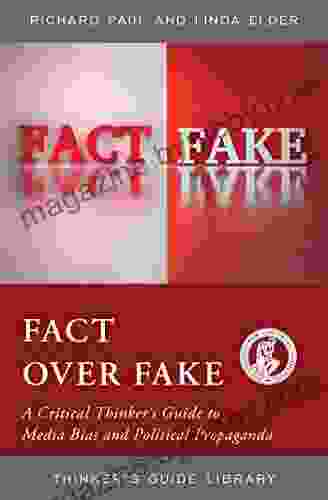
 Efrain Powell
Efrain PowellCritical Thinker's Guide to Media Bias and Political...
In a world awash with information, it has...
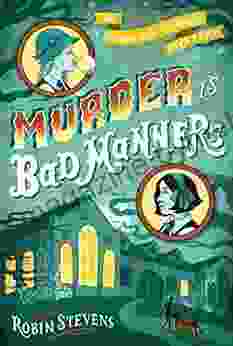
 Aubrey Blair
Aubrey BlairMurder Is Bad Manners: An Unforgettable English Mystery
Prepare yourself for a captivating literary...

 Luke Blair
Luke BlairDon't Settle For Safe: Embrace Adventure and Live a Life...
<p>In this inspiring and...

 W.H. Auden
W.H. AudenRoblox Codes Dragon Adventures King Legacy All Combat...
Roblox is a massively popular online game...
4 out of 5
| Language | : | English |
| File size | : | 2915 KB |
| Text-to-Speech | : | Enabled |
| Screen Reader | : | Supported |
| Enhanced typesetting | : | Enabled |
| Word Wise | : | Enabled |
| Print length | : | 449 pages |


